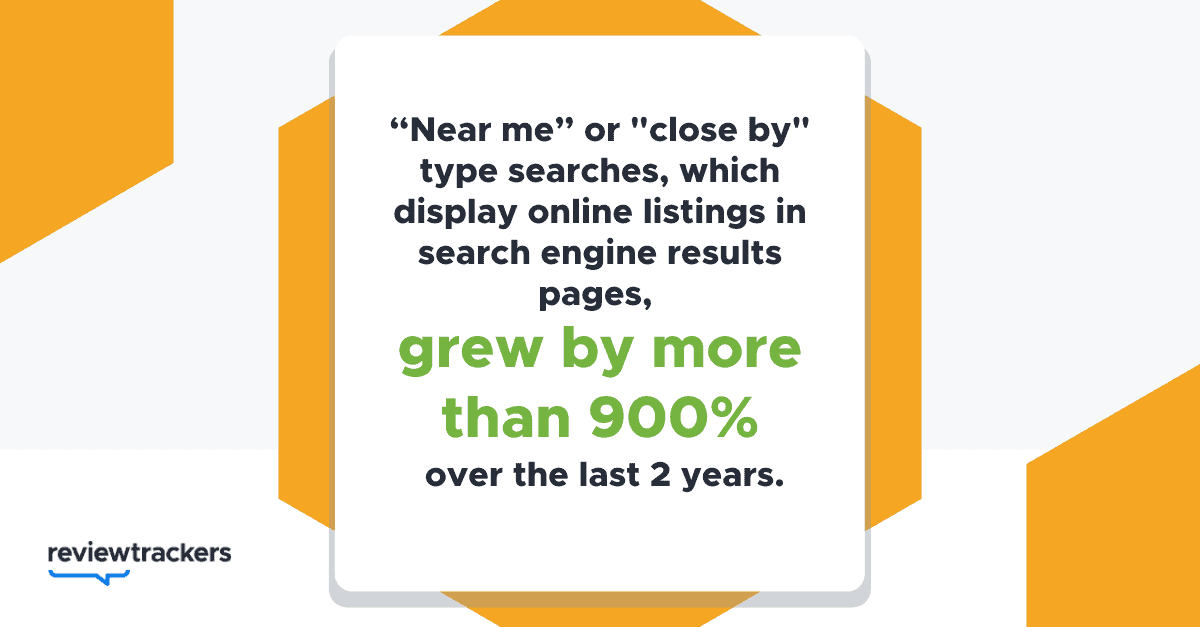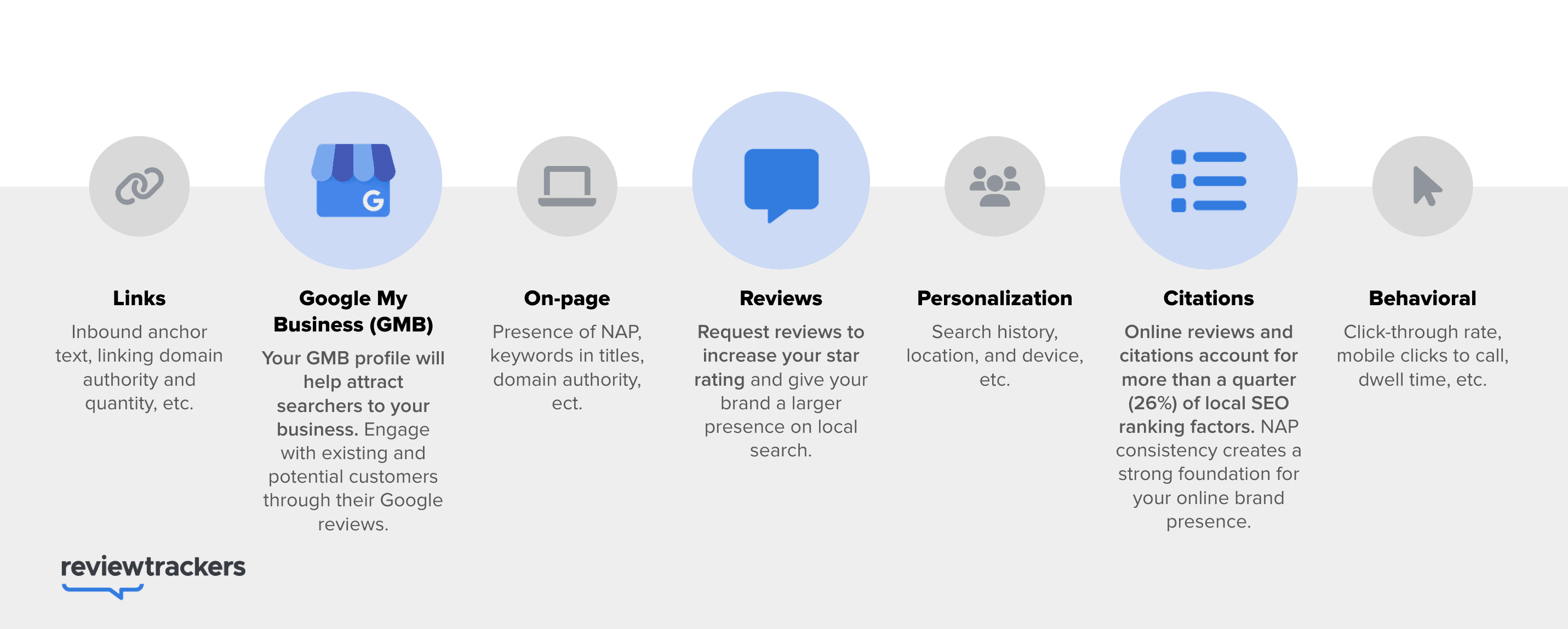Knowing what factors affect local SEO (local search engine optimization) is crucial to improving your search ranking, regardless of whether you’re managing a small business or running an enterprise-level organization with hundreds or thousands of business locations.
According to local SEO statistics:
- 46% of all Google searches are looking for local information. Moreover, 97% of search engine users have searched online to find a local business. (Go Gulf)
- Millennials speak the language of local search. They’re 50% more likely to use local search when they’re on the go — and twice as likely as other age groups to search for a business to visit immediately.
- 58% of companies don’t optimize for local search. 31% would like to. But only 30% actually have a plan in place for capitalizing on this high-converting traffic.
In short: higher local SEO rankings = more store visits and sales = increased traffic and revenue.
How Does Google Determine Local SEO Rankings?
According to Google, local search rankings are based on 3 primary factors:
Relevance
Relevance refers to how well a business listing or the content of a website matches what a user is searching for. Complete, detailed, and up-to-date business information improves your relevance and helps match your listing to relevant local searches.
Distance
Distance refers to the distance between your listing’s indicated location on Google and the location term used in a Google search query. The location term is simply the user’s location, so: the closer your business is to the user, the higher your business is likely to rank.
Prominence
Prominence refers to the offline and online prominence of your business. According to Google: “Some places are more prominent in the offline world — famous museums, landmark hotels, or well-known store brands.” Online prominence is determined on the kind of information available on the Web about your business — including quantity and quality of online reviews and online scores and ratings.
What Factors Affect Local SEO?
Let’s dive deeper into specific local SEO ranking factors that should shape your tactics and strategy. Factors such as links, on-page signals, personalization, and behavioral signals matter as much as ever. However, this time, let’s take a closer look at three important local SEO factors that have emerged in the last few years.
Google Business Profile (Google My Business)
One of the most effective and fundamental ways to improve your local SEO performance is to claim your online listings and manage your brand information using Google Business Profile (formerly called Google My Business).
Be as detailed as possible when entering your business information. Include your business name, category, map location and service area, phone number, website URL, hours of operation, etc. It also helps to add high-quality photos, which enhance the visual appeal of your business listing and may appear in local search results, too.
At all times, make sure the information on your Google Business Profiles is correct, complete, and up-to-date. We can’t stress this enough.
Well-managed local listings on Google can foster significant improvements in local search performance, with particular emphasis on the “relevance” factor of local SEO. Business listings that have been claimed and updated on Google — and which also boasts of strong Google reviews and ratings — are the ones most likely to rank at the top of local search, or even be featured in the “local pack.”
Read more: Google Maps Pack Strategies to Help You Rank
Online Reviews and Ratings
Along with third-party researchers and industry professionals, Google has made it clear that online reviews have a major impact on your local rankings.
Online reviews and ratings of your company on Google (as well as on other third-party business review sites) can lead to greater online “prominence” — one of the three primary factors that affect local SEO.
This means you have to learn how to respond to negative reviews as well as positive feedback. Not only does responding to reviews help drive engagement and create the kind of fresh content that is typically crawled by search engines; it also shows that your brand values feedback, helping boost shopper confidence and foster consumer trust.
Apart from responding to reviews, it also helps to develop a strategy around asking for reviews. This online review management tactic should benefit your brand, whether your starting point is zero or if you already have a hundred reviews.
Local Listings, Citations, and NAP
Local listings and citations appear in search results when people search for your business online. Not only do they display your business information; they also play a vital role in determining your brand reputation, search engine rankings, and revenue.
Local listing management should be a fundamental part of your local SEO strategy. This involves strategically creating or claiming your local listings, building citations, and ensuring NAP (name, address, phone) and local data consistency across the web.
Why is NAP important? Well, it relates to all the factors that affect local SEO. In the US, 37% of businesses have at least one incorrect or missing name on their listings. 43% have at least one incorrect or missing address. And 18% are missing their phone numbers. The estimated cost of wrong local data is $10.3 billion in potential annual sales.
It’s easy to make the mistake of having variations in your business information. But avoid this as much as possible. Attention to detail matters. For example, if your business location is at 78 Fort Worth Street,” then stick to that way of spelling it, instead of a variation like “78 Ft. Worth St.”
If your local data appears to be unstable, inconsistent, or outdated, Google is less likely to reward your business listing with a high local ranking.
Read more: SEO Near Me Strategy: How to Rank for “Near Me” Searches
Local SEO Ranking Factors Help You Reach Your Audience
The factors that affect local SEO should guide your team as you work to establish and enhance your online presence. By managing your Google Business Profile, your online reviews and ratings, and your local listings and citations, you can successfully optimize your brand presence in ways that perform locally and reach the right audience.


